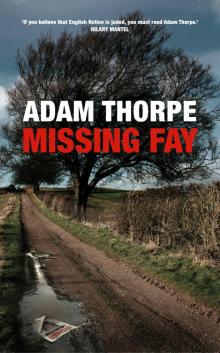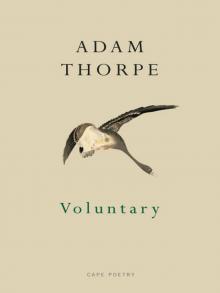- Home
- Adam Thorpe
No Telling Page 26
No Telling Read online
Page 26
‘Yes, back from the dead, thank goodness,’ I murmured, which seemed to impress her. I was thinking of my sister.
She suddenly put her hand to her mouth. I thought she’d swallowed something the wrong way and I’d have to save her.
‘My God! I’ve just realised! I saw Claude Bessy playing Swanilda two years ago – and then she had her awful car accident, last year! It’s the Curse of Coppélia all over again!’
‘I hope nothing happens to you,’ I mumbled, too softly for her to hear. I didn’t feel like saying it again.
Later, we were all getting our coats in an alcohol-scented cloud of goodbyes and kisses and more jokes, and I found myself next to her.
‘Fancy,’ she said, turning to her mother, ‘Cousin Gilles adores the ballet! We’ll have to invite him to Coppélia! He’s not a complete savage!’
Her mother was in her huge fur coat. The brown face looked minute, despite the weird grey eyes. She told Jocelyne to shush as if she had said something embarrassing, rather than rude. Emil and my uncle kissed four times on the cheek and kept slapping each other’s shoulders and laughing. Gigi, who was a bit unsteady and was being supported by my aunt, announced that the next time we all met would be at his grandson’s communion, and everybody looked at me. Instantly I had some sinful interference – a mixture of nude women’s bottoms and the filthy jokes about girls my schoolmates told. It was probably the wine. I grinned like an idiot. All the family saw, of course, was an innocent boy in shorts, robed in a pure white alb in their imaginations.
‘Who’s Claude Bessy?’ I asked my mother, on the way back.
‘Isn’t she that ballet dancer? Who had that crash, that car crash? Why? Do turn that music down, Alain.’
‘It’s Claude Nougaro,’ said my uncle, puffing on a cigar.
‘She’s getting better,’ I said. ‘She’s going to dance again.’
‘You bloody well like Claude Nougaro—’
‘That shows what strong faith can do,’ said my mother.
‘What does?’ my uncle growled.
‘We’re talking about Claude Bessy. The one who always crossed herself before going onto the stage. She had that dreadful accident,’ she added, flatly.
‘Who’s Claude Bessy?’
‘Never mind, Alain,’ she replied, looking out of her side window.
‘I was talking about Claude Nougaro.’
‘Gilles and I are talking about other things,’ my mother said, in a teacher’s sort of voice. I realised that she had had ‘a drop’, too. ‘You were getting on very well with Jocelyne, Gilles. Not so loud, that’s all,’ she added, for my uncle.
‘Oh, you’re talking about other things, are you?’ my uncle said, imitating a posh woman, his leather-gloved hands flexing on the wheel. We were stuck behind a funeral hearse. He didn’t turn the volume down. ‘What things?’
‘It doesn’t matter,’ said my mother.
‘Ballet,’ I said, head between the seat-backs, letting my ears touch each side in turn by exaggerating the car’s movement. The chrome bumper on the black hearse in front showed our car in its polish, all tiny like a Dinky.
‘Right,’ said my uncle.
The hearse turned off down a side-street. There was a little silence while the car droned on towards our house. It was a very loaded silence. My hands rested on the seats’ backs, fingers stroking the cheese-grater patches along the top.
I knew we were all thinking of one thing: Carole’s nude dancing. I felt embarrassed. I started asking questions about the 47mm anti-tank gun and whether it hadn’t been more accurate than the German 75mm Pak 40. My uncle went into lots of detail about French weapons and said that Emil didn’t know his shot-up arse from his finger. He sounded very angry with Emil. My mother didn’t say anything. I sat back with my head against the window, letting it vibrate. Then there was a pause.
‘You were getting on very well with Jocelyne, Gilles,’ my mother said again, like a magnetic tape.
‘Double entry book-keeping, if you marry her,’ my uncle shouted, over the music from the radio – or as if he was still in the restaurant. ‘And leftie bloody charlatans as your in-laws!’The car was thick with his cigar-smoke, and he chuckled throatily as my mother told him to shush.
I ignored him, secretly pleased as my temple bumped on the cool vibrating glass of the Simca.
Coppélia, I reminded myself. Coppélia. Coppélia. Coppélia. Coppélia.
12
I boned up, of course, on Coppélia.
There was a new library at Bagneux, named after some commie writer according to my uncle. I surprised my parents by using it, as I’d not been interested in books, recently. I found a book with black-and-white photographs and the stories of the main ballets by someone called Alphonse Duquet. It was too large to hide and, as I hadn’t brought a bag, I had to hold it under my arm so that no one could see the title or the picture on the cover. I pedalled back home, wobbling all over the place. It was very cold and grey and my fingers went numb. I decided that if Christophe or one of the boys he hung around with were to see what I was carrying, I’d say it was for Carole. But I got back home without being spotted. I was about to creep up to my room when my mother came out of the kitchen.
‘Ah, Gilles, you can help me clean the lamps. And I’m not dusting your room for you, I’ve just—’
‘OK. In a minute. It was done last week.’
‘What are you hiding?’
‘I’m not hiding anything. It’s just a book.’
‘You’re very keen I don’t see it,’ she called after me, as I took the stairs two at a time.
‘It’s nothing!’
‘Gilles!’
I stopped on the landing. I ought to have shown her straight off, I thought.
‘What?’
I leaned over the banisters, the book under my arm. She blinked up at me in a fretful manner. Her rubber gloves had soap suds dribbling down them.
‘Please don’t run off when I’m speaking to you, Gilles.’
‘Sorry.’
‘I wanted to say, if you don’t mind, that I’ve just cleaned your bedroom tiles and they might be wet. If the floor’s dry, you can put the rugs back. I’ve shaken the rugs out. They were full of pine-needles. Where have you been to get pine-needles?’
‘Under a palm tree,’ I said. ‘Tahiti.’
‘I’ve cleaned your radiator with that new spray, too,’ she went on, as I started to move off. ‘Try not to put dirty fingers on it. And don’t be cheeky, please.’
‘Yahwol, Maman.’
The inflatable chair was on my bed and the rugs were on my desk, rolled up. I took off my shoes and stepped over the tiles, the wet making their brown rectangles look even more as if filled to the brim with milk coffee. There was a nasty smell, under the lemony cleaner, of old mops. I had to share the bed with the inflatable chair, resting my back against it. The book had only been taken out by girls with names like Miche-line and Denise, and that not very often; the first borrowing was stamped 1958, before I could even read properly. Someone – not one of these girls, surely – had added rude details to some of the photographs; one ballerina had an arrow sticking up between her legs as she perched on one toe, and another had nude bosoms drawn over the skin-tight costume.
There were five pages on Coppélia, beginning on a huge curly I with a ballet dancer on the top of it, like an illuminated Gospel. I was hoping for just one simple page, that I could learn by heart. I hadn’t yet told my mother about Jocelyne’s invitation to her show; I preferred to wait until I knew the offer wasn’t a joke. I didn’t need to say it was ballet, I could just be vague about it. I could say it was a variety show. The biggest challenge was not to blush when I told her.
I flicked through the book for a bit, feeling lazier on the bed, and then started reading the five pages of the Coppélia story, pressing my back against the inflatable chair. I imagined Jocelyne was sitting at my feet, listening to the voice in my head that read really well, and nodding and smiling.
Once upon a time, on the edge of the vast Austro-Hungarian Empire, there lay the province of Galicia, and in Galicia was a little village smelling of wood-sap and cows, and in this village lived an eccentric old toymaker. His name was Dr Coppélius, and he was famous for his mechanical dolls. His house was a great timber building with lovely carved balconies and gables, but no one was ever allowed inside.
One day a beautiful girl appeared on his balcony, reading a book. Was this his daughter, the villagers asked themselves? It must be! She was called Coppélia, and he had hidden her away all this time as mothers secretly embroider an intricate napkin for their child’s betrothal.
The young men all fell in love with her, but none more so than Franz. And his fiancée, Swanilda, mourned his love.
No word had been exchanged between Franz and Coppélia: in fact, no one had ever heard her speak. She had never come down from the balcony. She just sat there, reading. She would neither move nor lift her head when Franz waved to her. And then she would slip back, as if by magic, into her father’s house.
And this only made Franz suffer even more.
In Swanilda’s view, Coppélia was horribly arrogant. In Franz’s view, she was beautiful and mysterious.
The story was quite good, considering it was really for girls. There was a purple crayon scribble all over the second page, and I imagined a family taking it in turns with the book: the older brother adding his rude details, the younger one scribbling with his crayon, and Micheline or Denise in the middle getting angry. This made me chuckle to myself, forgetting Jocelyne at my feet.
It was a warm evening, full of the fragrance of harvest and the slow chewing of cows. Franz wandered into the square looking as if he had not slept for weeks. Swanilda was there, too, hiding in the shadows. Franz looked up at the balcony and at the beautiful girl thereon and he waved and he called but she did not move. How desperately he tried to attract her attention!
And so he danced. He danced a most marvellous polka. A mysterious shadow appeared in the window behind the beautiful girl on the balcony. Suddenly, she rose – Coppélia rose! – bent over the balcony’s rail, and Franz’s idol, his only thought in the world, blew him a little kiss.
Her sleeve, dropping back, revealed a pale and shapely forearm, just as mist might suddenly part to reveal a stretch of sunlit lake. Who knows what might have happened if Dr Coppélius had not appeared at that moment and led his daughter back into the house?
I looked up, half-expecting the evening to have come, then shifted over onto my side, batting the inflatable chair until it rested on my legs. I cupped my head on my hand. I was filled with a sort of warmth, as if I had been standing in sunshine on a summer’s day. I could picture the village clearly and knew exactly what Franz was feeling for the girl on the balcony, who was really a mechanical doll (not an electronic robot at all, I thought). I read some more and then turned the page. The old, woody smell of the paper couldn’t cover the smell of the wet tiles, and I put my fingers over my nose. My fingers smelt of metal handles (probably the big ones in the library), with a nasty whiff of myself where my finger had been in my pocket, fiddling without meaning to.
There was a picture on the next page, in fact. It looked like an old photograph and was marked: Giuseppina Bozzacchi dans Coppélia. Photo Bibl. de l’Opéra de Paris, 1870. She was dressed in a huge tutu made up of lots of layers of net curtains and was standing on her toes in ballet slippers, looking straight out at me.
The older brother had left this dancer alone. She must be the tragic one Jocelyne had gone on about. I let my eyes wander over her for a moment, keen to get back to the story but holding back as I’d sometimes do when I needed to go to the toilet. She wasn’t the Swanilda I’d pictured in my own head, though. The story continued a bit under the photograph and then over on the next page. Swanilda had broken into Dr Coppélius’s house with her friends. I kept seeing his house as the old hospital, down in the creepy kitchens with the huge copper pans and cobwebs all over the shelves. The moment when she found Coppélia behind a curtain, sitting in her usual chair, was a bit like a horror film, I reckoned.
Swanilda, behind the long curtains, touched the beautiful girl’s hands. They were cold and hard, like wax, in the flickering light from the tiny oil lamp.
Swanilda thought the beautiful girl was dead. She had died in her chair, stiffening as clear wax stiffens around the snuffed candle. Her emerald eyes stared straight out, lifeless and yet glittering in the lamp’s uncertain flame. Swanilda wanted to scream.
Then she heard a little grinding sound, just like a clock makes when it is about to chime. It came from the hand she had touched. Its forefinger was moving up, up a bit more – and then it stopped. The clockwork sound stopped with it.
Swanilda cried out with relief. The hands were wax! Coppélia was a doll – a mechanical doll! A wind-up mechanical doll! One of old Dr Coppélius’s toys!
But so well crafted, that he had fooled everyone. Especially Franz.
All of a sudden, a deep howl of rage from the room beyond the curtains stifled her laughter. She heard the patter of her friends running out. The little flame in the oil lamp guttered in a draught that brushed the curtains against her face – the old, dusty curtains that had hidden Coppélia, and were now hiding Swanilda. For there was no Coppélia, in truth.
Blackness.
Behind the curtains the blackness was terrible. At any moment Swanilda expected the doll to stir next to her, its little heart of cogs and wheels furiously whirring, its eyes wide and alive
‘Gilles! Please help me with the lamps! You never help, these days!’
I blinked stupidly. My mother was standing in the doorway, still in her plastic apron. She’d really scared me.
‘What?’
‘You never help.’
‘I do.’
‘That’s a nice big book. What’s it about?’
‘Jet aeroplanes,’ I mumbled, half-closing it and moving my knees up to hide it a bit.
She came over and I turned the page hurriedly, not wanting her to see the Coppélia story. She stood over me, looking down at the new page, which was the beginning of the story of a ballet called Giselle. There was a photograph of a dancer perched on one leg, on tiptoe, with the other leg stretched out behind her at a right angle. You could see her slip showing between the thick thighs. Ulanova dans Giselle, it said. Unfortunately, the older brother had drawn two dots on her bosoms where the dance suit was stretched tightest. My mother’s hand appeared and flipped a few more pages on. There was now a photograph of what looked like a completely nude man covered in dark splotches, with a hairy chest and a sticking-out, naked bottom. David Lichine dans l’Après-Midi d’un Faune.
‘That’s an interesting aeroplane, dear.’
‘I forgot.’
‘Forgot what? What aeroplanes look like?’
She snatched the book from under my hand, to my astonishment, and snapped it shut. She looked at the cover.
‘Why?’ she demanded. ‘Why ballet?’
‘I didn’t do the scribbles,’ I said, blushing.
‘Why?’
‘Why? Well, it’s interesting.’
‘Interesting, is it?’
‘And I thought Carole might like to look at it.’
She stared at me then, her lips so tight they had disappeared. It was a horrible stare, almost as if she was searching into my brain, and the whole of her seemed to be trembling very slightly.
‘Did she ask you to get it for her? Did she? Carole?’
‘No. I just thought it’d be nice.’
‘You’re fibbing.’
‘I’m not!’
‘Why are you blushing?’
‘I’m not.’
‘Yes you are. Look at you. Bright red.’
‘I can’t help blushing.’
‘Why?’
‘You interrupted.’
‘Interrupted what?’
‘I was reading, Maman.’
She sat on the edge
of the bed, making me bounce. The inflatable chair rested up against the wall. All I wanted was for her to go. She put the book on her lap and sighed.
‘I don’t think it’s a very good idea,’ she said.
‘What?’
‘To show Carole this book.’
‘It’s only about ballet.’
‘Exactly.’
‘She used to do it.’
‘Gilles—’
She sighed, placing her hands either side of the book. She looked down at its shiny cover. It had an old-fashioned drawing of a dancer, floating in the air with a butterfly’s wings on her back.
‘A nice thought, I know, but it’s not suitable, dear. It’s not suitable at all.’
‘OK, I won’t give it to her, then.’
‘You mustn’t – you know she’s in a very bad way, Gilles.’
‘Quite bad.’
‘No.’
‘No?’
‘More than quite bad. Very bad.’
She slid a hand up over her face, making her spectacles almost fall off. They rested on her knuckles. She took them off completely and folded them and laid them on the book. She kept her eyes closed, as if praying. The top of her nose had red marks where her spectacles had rested on the skin. She bent her head and covered her eyes with her hand again. I suddenly saw a drop land on the book, and then another one. They immediately stained the shiny paper cover, making brown spots on the butterfly wings.
I studied my nails. I didn’t know what to say. I was annoyed with her, coming in here and interrupting. There were three or four more drops, ruining the library book even more, and then a huge watery sniff. She shivered, still with her face covered by her hand. The clock on my bedside table, with its picture of Lucky Luke, ticked loudly for about a minute. Then she fiddled in her apron and pulled out a cleaning cloth and wiped her nose with it. She blew her nose properly into it and wiped her eyes on her wrist. Now she’ll say ‘I’m sorry,’ I thought.

 Missing Fay
Missing Fay Hodd
Hodd Pieces of Light
Pieces of Light The Standing Pool
The Standing Pool Ulverton
Ulverton Nine Lessons From the Dark
Nine Lessons From the Dark Flight
Flight The Rules of Perspective
The Rules of Perspective From the Neanderthal
From the Neanderthal Is This the Way You Said?
Is This the Way You Said? Still
Still No Telling
No Telling Voluntary
Voluntary Between Each Breath
Between Each Breath